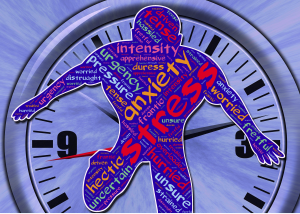Stress. This word has become such an ingrained part of our vocabulary and daily existence, that it’s difficult to believe that our current use of the term originated only a little more than 50 years ago. In daily life, we often use this term to describe negative situations which can lead to the belief that all stress is bad for you. Stress is neither good nor bad. It is our perception of our capacity to cope which determines whether our stress response is positive or negative. A situation that causes fear, panic and inactivity in one person may motivate and stimulate someone else.
Our body’s stress response is stage managed by our nervous system and hormones working together. Faced with a threatening event or situation (and that could be physical or emotional) our ‘fight or flight’ response kicks in and our adrenal glands release the hormones adrenaline and cortisol to prepare us for the approaching danger, demand or challenge. Heart rate is speeded up to increase the flow of blood and oxygen around the body, muscles become tense and taut, body functions such as digestion, elimination and immunity are put on hold as they’re not considered essential in an emergency situation. Memory and rational thinking are also placed on the back burner during this flight or fight response. BUT this state of red alert is only intended to be temporary.
As soon as the emergency or threat is over, your (parasympathetic) nervous system tries to restore balance and return you to a normal ‘rest and digest’ state. The problem is, your nervous system doesn’t know the difference between every day stressors and life-threatening events. You may be upset over an argument, stuck in traffic or facing a mountain of bills and your body can still react as if you’re facing a life-or-death situation. It’s not good for us to experience this response repeatedly in daily life. With our bodies in this high state of alert, those body systems which have been suppressed may become malnourished and weakened. This can lead to a wide variety of health conditions including raised blood pressure, a weak immune system, digestive problems, muscle pain, headaches and sleep problems to name but a few.
Complementary therapies like Reflexology can help to interrupt this stress pattern and give the body the opportunity it needs to switch off the flight and flight stress response and return the body back to a balanced state. Research studies have shown through the measurements of alpha and theta brain waves that Reflexology is effective in lowering blood pressure and anxiety levels. With over 7000 nerve endings on each foot, it’s not surprising that many people find Reflexology has a profoundly soothing effect on the nervous system.
That the birds of worry and care fly above your head, this you cannot change. But that they build nests in your hair, this you can prevent. (Chinese proverb)

